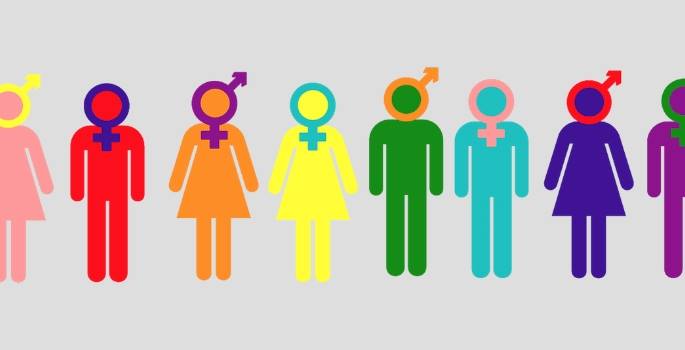What is gender?

The Event Blurb
What does it mean to be male or female, a man or a woman, masculine or feminine? Gender has become a battleground, with scientists, philosophers, writers and activists clashing over its definition, and even its usefulness as a category at all. Since it is with our bodies that we act, and since psychological and social causes can affect our bodies, there is much debate about the relationships between sex and gender. Where is the line where "man" becomes "woman", and vice versa - is it to do with having the "right" genitals, or a particular kind of brain? Can science help us figure this out or is our science as biased as we are?Are people who want to transitioning gender to gender actually reinforcing the idea that there are fundamental differences between the two (or more)? Are there fundamental differences between them?
1. Definitions (World Health Organization)
Sex refers to biological differences between males and females. Gender refers to the meanings that humans make of these biological differences, and the individual and social aspects of masculinity and femininity.
Gender refers to the socially constructed characteristics of women and men – such as norms, roles and relationships of and between groups of women and men. It varies from society to society and can be changed. While most people are born either male or female, they are taught appropriate norms and behaviours – including how they should interact with others of the same or opposite sex within households, communities and work places. When individuals or groups do not “fit” established gender norms they often face stigma, discriminatory practices or social exclusion – all of which adversely affect health. It is important to be sensitive to different identities that do not necessarily fit into binary male or female sex categories.
Gender norms, roles and relations influence people’s susceptibility to different health conditions and diseases and affect their enjoyment of good mental, physical health and wellbeing. They also have a bearing on people’s access to and uptake of health services and on the health outcomes they experience throughout the life-course.
There are often misconceptions about terms related to gender. Learn more by reading the glossary of terms related to gender, equity and human rights.
2. Biological arguments for non binary (quote stolen off the internet)
"In a sexual species you can have females be XX and males be X (insects), you can have females be ZW and males be ZZ (birds). You can have females be females because they developed in a warm environment and males be males because developed in a cool environment (reptiles). You can have females be females because they lost a penis sword fighting contest (some flatworms). You can have males be males because they were born female but changed sexes because the only male in their group died (parrotfish and clownfish). You can have males look and act like females because they are trig to get close enough to actual females to mate with them (cuttlefish, bluegills and others). You can be one of the thousands of sexes (slime, mold, some mushrooms).
Oh did you mean humans?
You can be male because you were born female, but you have a 5-alphareductase deficiency and so you grew a penis at age 12. You can be female because you have an X and a Y chromosome, but you are insensitive to androgens and so you have a female body. You can be female because you have an X and a Y chromosome but your Y is missing the SRY gene and so you have a female body. You can be male because you have two X chromosomes but one of your X’s has a SRY gene and so you have a male body. You can be make because you have two X chromosomes but also a Y. You can be females because you have only one X chromosome at all. And you can be male because you have two X chromosomes but your heart and brain are male. And so on and so on.
Don’t use science to justify your bigotry, the world is way to weird for that. "
In diagram format: (larger version is here, and source article in Scientific American is here)
3. An argument to go beyond biological arguments:
Xenofeminist Manifesto calls for a gender abolitionist feminism that rejects natures definitions of sex and gender, regardless:
- Gender does not determine our personality, preferences or abilities. As such the categories of 'male' and 'female' are misguided and unhelpful. We will only realise our true potential as individuals when we stop using gender to guide our identities. more that gender equality, feminism should aim for gender irrelevance.
- For too long we have been defined by our reproductive roles, but an ability to bear children does not determine gender. Post menopausal women and child bearing trans men are proof of this. And any feminism based on women's 'natural' affinity for maternal care is wrong headed and dangerous. We must distribute the burdens and pleasures of care across the entire population as part of our efforts to make gender irrelevant.
- Nature is sometimes offered as an explantation for gender roles. Everything from evolutionary biology to endocrinology is wheeled out to support stereotypes. The scientific bases of these claims is often shaky. In any case there is no reason to accept injustice just because it's 'natural'. Nature can be changed. Biology is not destiny because biology itself can be technologically transformed and should be transformed in the interested of human freedom.
Source of these summary notes of the manifesto is here
Link to the manifesto itself is here
4. Discussion around post gender strategies
i) Changing your language - stop using the words masculine and feminine and just say what you actually mean :)
ii) List of post gender strategies iii) Foucault, Femininity and the Modernization of Patriarchal Power
iii) Foucault, Femininity and the Modernization of Patriarchal Power

